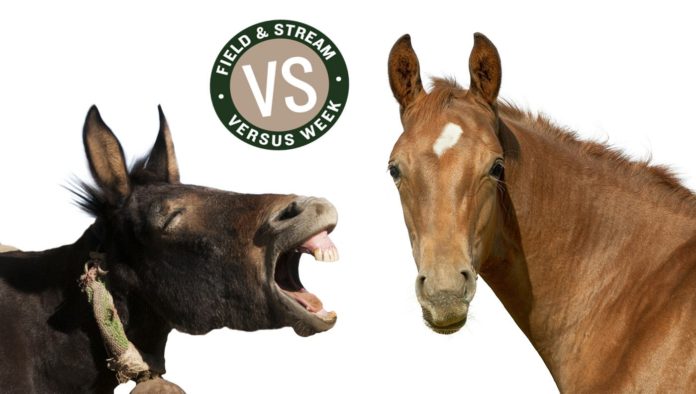Editor’s note: As hunters and anglers, we don’t agree on everything. We’ve even been known to argue on occasion. That’s why this week is all about figuring out who’s right and who’s just plain wrong. Every day we’ll be posting stories to get to the bottom of hunting and fishing’s most important debates—like 870 vs. 500, summer sausage vs. venison jerky, and fly fishing vs. spin fishing. Welcome to Versus Week.
It may come to pass in your hunting career that you are given a choice of riding a horse or a mule, the mule part of which causes some folks to take affront. Horses convey chivalry and romance. Mules are vaguely comical. In the old Hollywood westerns, sidekicks rode mules. If the Lone Ranger had showed up on a mule instead of his great white stallion, Silver, there would have been riots at Saturday matinees everywhere. By the 1960s the mule, which had done much of the heavy lifting in the settling of this country, had fallen into such obscurity that there were perhaps only 10,000 left in the United States.
Horses never went away, so I don’t need to defend them here. The mule, however, could use a good reference, which makes this post somewhat skewed. It’s one of the more useful animals created by man, in many ways superior to a horse. Let’s take a look at the two, and see how each stacks up.
The Pros and Cons of Horses
The horse fairly reeks of glamor. There are few animals as beautiful as an Arabian, or as strong and impressive as a Belgian or a Clydesdale, or as striking as an Appaloosa. For hunters, the horse is a godsend. It can roughly double what you are able to cover on foot in a day. When you’ve lost track of where you are and where camp is, your horse knows exactly. When you find yourself blind in the pitch darkness, your horse can see as though he was wearing night-vision goggles. If packing out hundreds of pounds of meat, hide, and horns will send you to the orthopedic surgeon, a horse can do it and scarcely pull a deep breath. If your horse’s head suddenly comes up and his ears snap forward, it may be he has seen game that you did not. This is because his eyesight and hearing and sense of smell are much better than yours.
On the other hand, every horse is an individual, strong or weak, stupid or smart, slow or fast, placid or panicky. Moreover, horses respond to how well or poorly you ride them. If you saw at the reins, yank on the bit, flop around in the saddle, or kick constantly, you will soon be riding a very unhappy horse who will be thrilled to scrape you off its back by way of a low tree limb.
Horses are flesh and blood, and wear out. The average elk-hunt cayuse will probably be close to exhaustion by the time you get him, leg-weary and suffering from weeks of a poor diet. Have a heart and don’t beat on him. On the other hand, many horses loaf when they can get away with it, and a tap with a Field Expedient Equine Motivational Device (a switch, which you cut) will remind him of where his duty lies.
Horses are subject to panic attacks. For much of their history, they were what was for dinner, and so if something spooks them, they react instantly, either by kicking, or bucking, or stampeding. If you’re in the saddle when this happens, you’re in trouble. I’ve never known anyone who spent a lot of time with horses and did not get bashed, but good, at some point.
All the Reasons Why Mules Are Better
The mule is a hybrid, produced by mating a male donkey, or jack, with a lady horse. Mules were familiar 3,000 years ago in ancient Egypt, and were originally imported and bred in America by George Washington, who was first in war, first in peace, first in the hearts of his countrymen, and first to ask “Why don’t we have mules?”, and do something about it.
Most mules weigh between 800 and 1,000 pounds. They come in all colors and can range way above or below those weights depending on the size of their dams. The creatures benefit from a phenomenon known as hybrid vigor; they inherit the best qualities of both the horse and the donkey. The list of ways in which mules outshine horses is so long as to be embarrassing.
Mules are stronger than horses. They can carry more weight and carry it farther without breaking down. During World War II, pack mules served the U.S. Army in Sicily, Italy, and the China-Burma-India Theatre, wherever there were mountains that Jeeps could not navigate and heavy loads that had to be carried over them. In Korea, the U.S. Army ignored mules, but the Chinese Army did not, and our G.I.s used captured mules, feeding them the cereal packets from their own rations. Special Forces used mules in Afghanistan, and at one point SF troopers could take a course in mule management at Ft. Bragg, N.C.
There are reasons for all this.
- Mules are smarter than horses (which is not all that difficult) and have better memories.
- They can subsist on less feed than a horse, and poorer feed.
- Their hooves are smaller, and harder, than a horse’s, and mules are much surer-footed.
- They can work in heat that would founder a horse.
- Mules live longer than horses and are more resistant to disease.
- If you treat them with kindness, they’ll bond with you in a way that horses won’t.
Mules don’t react to the world in the way that horses do. In the face of perceived peril, a mule will not panic and go thundering over a cliff. He will stop and think about the situation, and if he decides that whatever is afoot might be dangerous he will go no further. Mules, I’ve been told, will never do anything that might hurt them, and their legendary stubbornness is actually a form of self-preservation. (Mules will also balk if they’re confused or have no idea what you want them to do.)
A mule is not as fast as a horse. They walk about 4 miles per hour, which is 1 mph faster than you do on level ground, and about the same as a horse, but a horse will outrun them at a gallop.
Mules kick. I’ve heard this from so many different sources that there must be some truth to it. Mark Twain wrote “A mule will labor joyfully for you for 20 years in the hopes of landing one solid kick.”
If someone offered me a mule, I’d consider myself honored. A little while ago I asked my colleague Tom McIntyre what he thought of riding mules. “A good mule,” he answered, “is a Cadillac.”
Credit: Source link






























